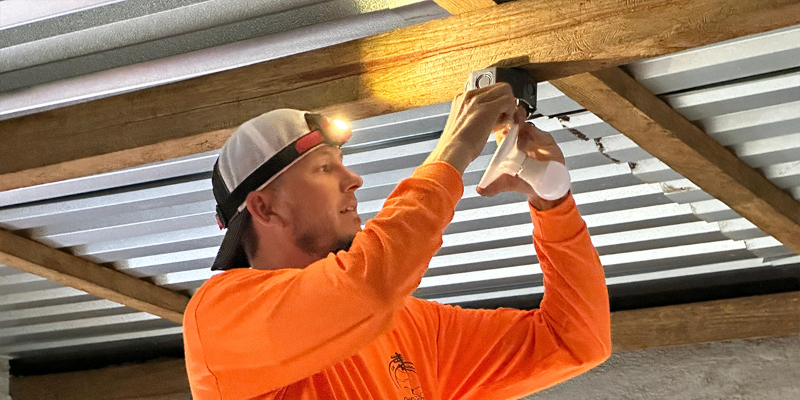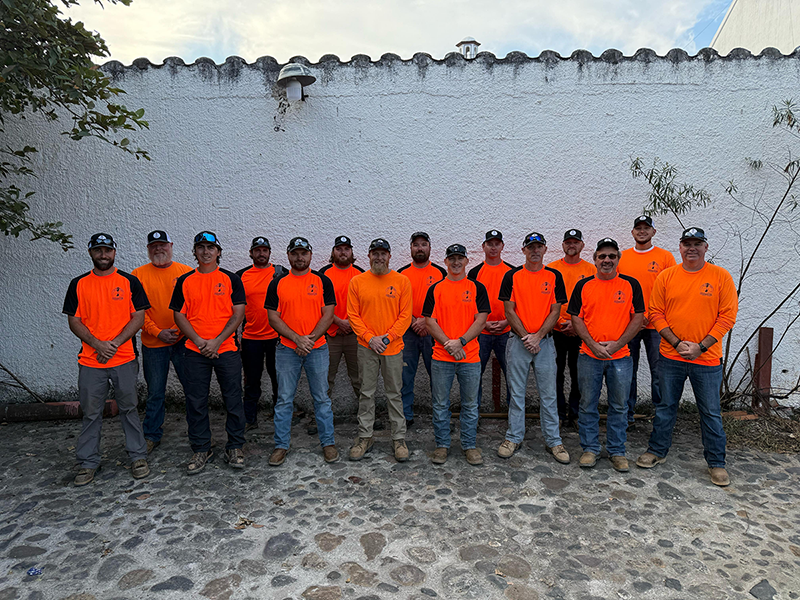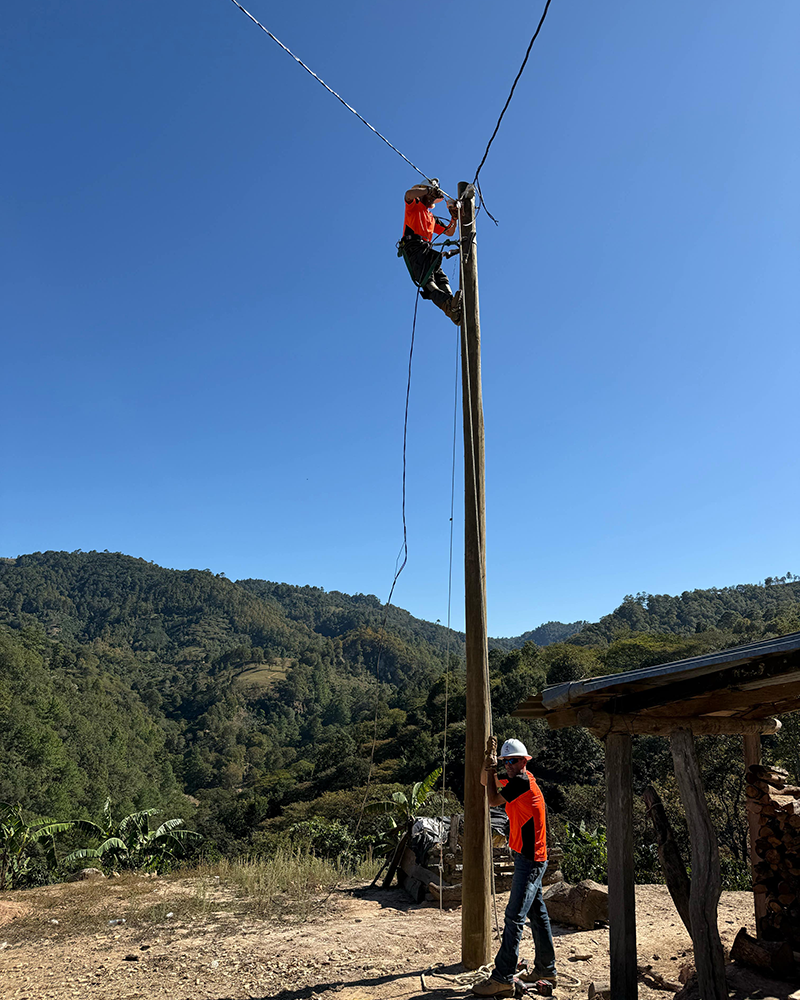Co-ops Demonstrate Global Leadership, Community Commitment

In January, 15 line workers from 10 different Ohio electric cooperatives spent nearly three weeks in Guatemala building infrastructure and making hook-ups to bring first-time electricity to a rural Guatemalan village. CFC and NCSC provided $70,000 in grants to support the mission, which was coordinated by Ohio’s Electric Cooperatives (OEC) and NRECA International.
This was Ohio’s fourth international electrification project since 2016.
“The concept of helping others is not only a simple thing to understand, but it’s so consistent with who we are as cooperatives,” OEC’s Senior Director of Safety Training and Loss Prevention Dwight Miller said. “It’s really easy to forget how good we have it in the most prosperous nation in the world. We are so blessed in the U.S., while 1.3 billion people around the world still live in the dark. And there are no plans to light up those places without teams like ours, together with our partners, stepping up to do the hard work.”
This project, in the village of Barejones, east of Guatemala City, was the second part of a two-phase effort begun by Oklahoma cooperatives last October.
“The entire project originally was assigned to Oklahoma, but the scope of the project was too large for a single team,” Miller said. “Their team built the backbone of the project, and they had quite a job building the primary line up the mountain into the village! Our Ohio team worked directly in the village, wiring up the rest of the homes and building a small amount of primary line with a considerable amount of secondary mains and services.”
The Ohio team ended up constructing about 1 km of primary line and 4 km of secondary mains, installed six transformers, extended service wire and added meters to all of the village’s 93 homes, two churches and two elementary schools. The team also wired about 63 homes and installed 15 streetlights around the village. But unlike most crews that participate in these international electrification projects, they were not able to witness the lights coming on.
“The guys did all they could do with the project, but there were circumstances beyond our control,” Miller said. “Guatemala is Guatemala and it is not the U.S., meaning that it can be difficult to get used to the slow pace and occasional dysfunction. Often, our crews are ready to go, but there’s one more thing that we have to wait on.”
In this case, Energuate, the largest energy distribution company in Guatemala, had not signed off on the permit to allow the connection to be made to their distribution system by the time the Ohio team was scheduled to leave. And as of late June, that permit still hadn’t been issued, meaning that about 500 villagers remain without power. Eventually, the local municipal utility, Empresa Eléctrica Municipal de Jalapa, will energize the new line, subject to Energuate’s approval and release of the permit.
This is the second time the Ohio team had to leave Guatemala before the project they were working on was energized.
“On March 9, 2020, we sent a team to light up the village of Tierra Blanca Sebol,” Miller said. “Think about that time: March 2020. I remember the team asking me about this ‘COVID’ thing that was being talked about, and I remember telling them that the latest guidance was that they had the right to ask someone to cover their mouth on the plane if they started coughing. Well, it’s not hard to remember what happened within the next two weeks!”
Miller spoke with Kyle Hoffman, chief operations officer at Lorain-Medina Rural Electric Cooperative and North Central Electric Cooperative and Ohio team lead, and told him to pack up and get the team to Guatemala City as soon as possible before the country shut down and locked the doors. Fortunately, the team was close to finishing the project.
“Kyle did an amazing job leading the team back to the city, but they didn’t make it before the country shut down, and they were officially stuck in Guatemala City,” Miller said. “Two days later, the team flew back to the U.S. on a private jet. The team did not get to see the lights come on, but they certainly did an amazing job. The day after they left, the local municipal utility, Empresa Municipal Rural de Electricidad, was able to energize the line and get the lights turned on.”
On the latest mission, the Ohio team had enough extra time to tackle a few other projects in Barejones, including building a safety fence around the school playground, which is near a cliff; installing a security gate into the village; and arranging for local contractors to replace the school’s inadequate septic system.
“When we do these international projects, we take them very seriously and we try to be very intentional to not only complete the electrification project, but also to do anything we can to make the villagers’ lives better,” Miller explained. “So, we raise money in the state and from employees of Ohio’s cooperatives and we channel that money to specific needs.”
On the second trip, the village requested the team to fix the old septic system so the school children could use the restroom. After the team was on-site, Hoffman worked with the principal of the school to identify other needs in addition to the septic system, and the team was able to complete almost all of the requests while the team was still on-site.
The Ohio team also purchased and distributed water filters for each household.
“We began this back in 2018 in the village of Las Tortugas, and it was so successful that NRECA International began making it mandatory for each state to provide these filters for each home on every project,” Miller said. “That means that thousands of Guatemalan villagers are now enjoying the benefits of clean water because of the efforts we made to try to make a difference.”

Two-Year Project Cycle
Ohio’s cooperatives have been strong supporters of international electrification projects since they first got involved 10 years ago and just this year officially declared their intention to support a new project every two years. As such, OEC plans to undertake another mission in early 2027.
“Assistance from CFC and NCSC helps defray a substantial portion of the costs for us to organize these trips and provide electricity to these underdeveloped countries,” OEC Vice President of Statewide Services Doug Miller said. “It is a privilege to have CFC and NCSC as partners on these projects. It demonstrates the values all our member co-ops share—commitment to community. In this case, our community stretches beyond our service areas, our state and our country to the rest of the world.”
